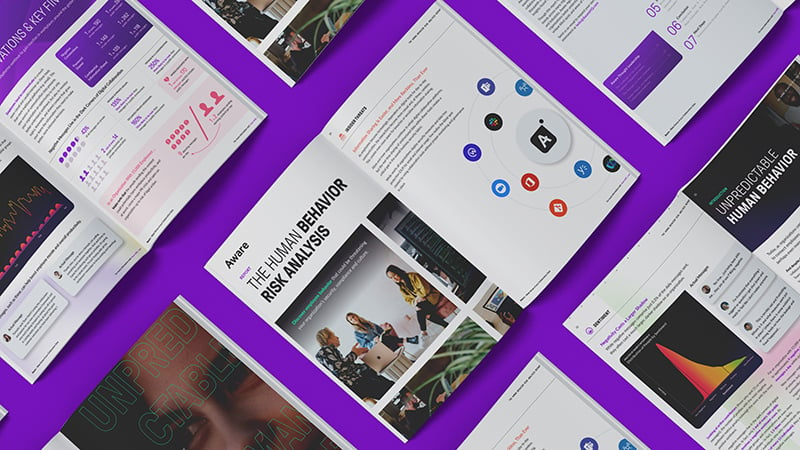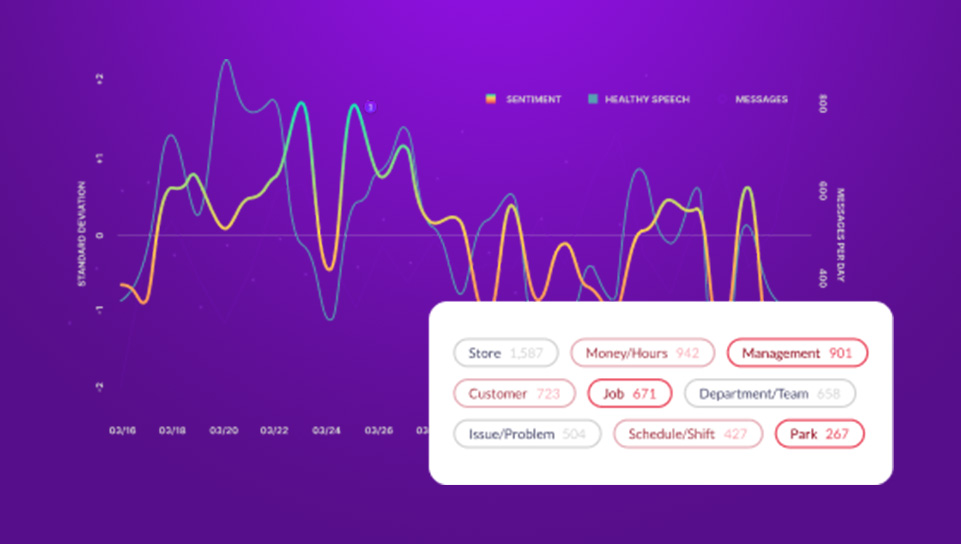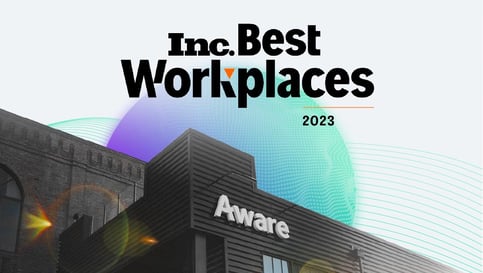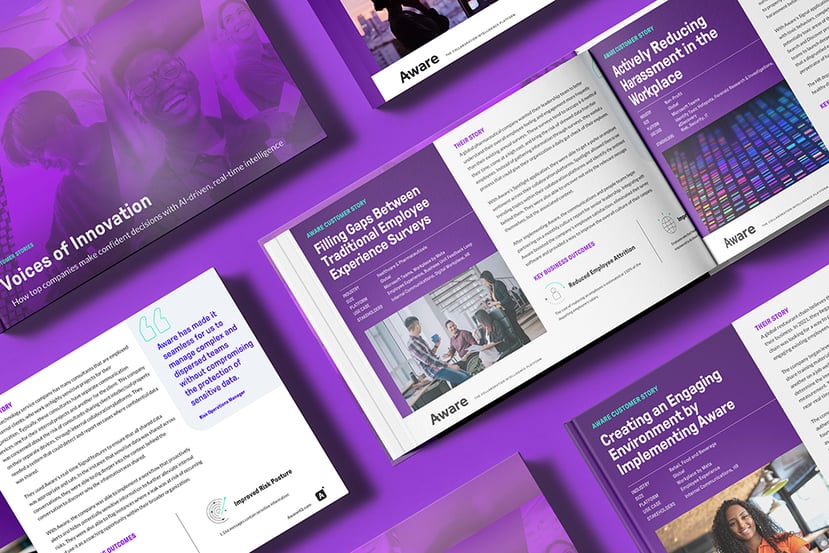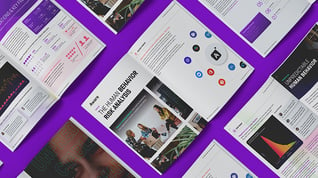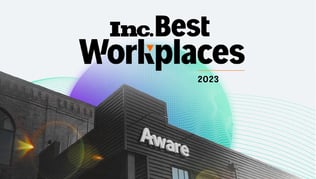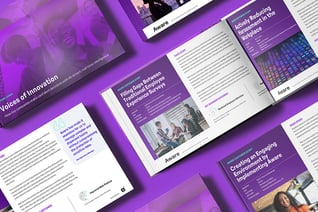Is Workplace from Meta HIPAA Compliant?
by Aware
First Published Jun. 2023. Updated Mar. 2024.
Meta Workplace is shutting down on August 31, 2025. Learn what you can do to prepare for a successful transition.
Enterprise social networks like Workplace from Meta are powerful tools for building community among your workforce and protecting your company culture. However, for highly regulated healthcare providers, additional precautions must be taken when using Workplace to ensure they remain HIPAA compliant. In this post, we explore everything healthcare providers need to know about HIPAA compliance in Workplace from Meta.
Contents
- What is Workplace from Meta?
- Is Workplace from Meta the same as Facebook?
- What is PHI?
- What is HIPAA?
- HIPAA compliance best practices [infographic]
- Is Workplace from Meta HIPAA compliant?
- Is Facebook HIPAA compliant?
- Does Meta sign a BAA?
- What security measures does Workplace from Meta use to protect PHI?
- Does Meta collect private healthcare information?
- Does Workplace from Meta sell PHI data to advertisers?
- What can I do to protect PHI in Workplace from Meta?
- How does Aware protect PHI and support HIPAA compliance in Workplace?
Workplace from Meta, formerly known as Facebook Workplace, is a communication and collaboration platform designed for organizations to enhance internal communication, collaboration, and productivity. With the transition to Meta, questions arise regarding its compliance with the Health Insurance Portability and Accountability Act (HIPAA) regulations. Read on to learn more about the HIPAA compliance status of Workplace from Meta, its relationship with Facebook, the handling of Protected Health Information (PHI), security measures in place, data collection practices, and steps users can take to protect PHI.
What is Workplace from Meta?
Workplace from Meta is a platform that enables organizations to create a dedicated space for their employees to communicate, collaborate, and share information. It provides tools such as group chats, video conferencing, file sharing, and news feeds to facilitate efficient communication and teamwork within companies. While Workplace from Meta shares similarities with Facebook in terms of its user interface and features, it operates as a separate platform dedicated to workplace communication.
Enterprises use Workplace to create a central location from which to broadcast top-down messages to the workforce, host events, recognize expectational performance, and build a workplace community. Some of the world’s leading corporations use Workplace by Meta as their company culture hub.
Is Workplace from Meta the same as Facebook?
While Workplace from Meta and Facebook share common features and design elements, they are distinct platforms serving different purposes. Workplace from Meta focuses on internal organizational communication and collaboration, allowing companies to create their own private networks. On the other hand, Facebook is a social networking platform primarily intended for personal connections and interactions. Although they may have similarities, Workplace from Meta and Facebook are separate entities with different objectives.
This similarity between Workplace and Facebook makes Workplace exceptionally valuable as an enterprise social network. Employees are typically already familiar with how Workplace works from using Facebook. This simplifies onboarding and improves adoption of the platform.
What is PHI?
Protected Health Information (PHI) refers to any individually identifiable health information that is created, received, or maintained by a healthcare provider, health plan, or healthcare clearinghouse. PHI includes various elements such as patient names, addresses, dates of birth, medical records, treatment information, and more. Examples of PHI include medical test results, doctor's notes, prescriptions, and health insurance information. Protecting PHI is crucial to maintain patient privacy and comply with HIPAA regulations.
What is HIPAA?
The Health Insurance Portability and Accountability Act (HIPAA) is a federal law in the United States that sets standards for the protection of sensitive patient health information. It regulates how healthcare providers, health plans, and their business associates handle and safeguard this information. HIPAA aims to ensure the privacy, security, and confidentiality of individuals' protected health information (PHI) while allowing for the necessary exchange of healthcare data for treatment, payment, and healthcare operations.
Covered entities, such as healthcare systems, must ensure that they comply with HIPAA at all times, including when using enterprise social networks like Workplace from Meta.
HIPAA compliance best practices [infographic]
%20-%20Page%201.png?width=1200&length=1200&name=Best%20Practices%20(8.5%20X%2011)%20-%20Page%201.png)
%20-%20Page%202.png?width=1200&length=1200&name=Best%20Practices%20(8.5%20X%2011)%20-%20Page%202.png)
%20-%20Page%203.png?width=1200&length=1200&name=Best%20Practices%20(8.5%20X%2011)%20-%20Page%203.png)
%20-%20Page%204.png?width=1200&length=1200&name=Best%20Practices%20(8.5%20X%2011)%20-%20Page%204.png)
%20-%20Page%205.png?width=1200&length=1200&name=Best%20Practices%20(8.5%20X%2011)%20-%20Page%205.png)
%20-%20Page%206.png?width=1200&length=1200&name=Best%20Practices%20(8.5%20X%2011)%20-%20Page%206.png)
%20-%20Page%207.png?width=1200&length=1200&name=Best%20Practices%20(8.5%20X%2011)%20-%20Page%207.png)
Is Workplace from Meta HIPAA compliant?
In its Terms of Service agreement, Workplace makes clear that it is not a Business Associate or subcontractor as defined by HIPAA and it is not HIPAA compliant. This means Meta may not have implemented all the necessary technical, physical, and administrative safeguards required to meet HIPAA standards. However, covered entities can still use Workplace as their enterprise social network if they take the appropriate precautions to safeguard PHI when using Workplace.
One of the stipulations of the Workplace TOS is an agreement “not to submit to Workplace any information or data that is subject to safeguarding and/or limitations on distribution pursuant to applicable laws and/or regulation.” This means that healthcare providers cannot upload or store any PHI data within Workplace and must take precautions to prevent employees from using Workplace for this purpose.
Is Facebook HIPAA compliant?
Facebook, as a consumer-oriented social media platform, is not designed to be HIPAA compliant. While Facebook has implemented various security measures to protect user data, it does not have the necessary safeguards in place to handle PHI in accordance with HIPAA regulations. Sharing PHI on Facebook is not recommended and may violate HIPAA rules. Therefore, organizations dealing with PHI should avoid using Facebook for any healthcare-related communications or data sharing.

Read more: Enterprise collaboration and HIPAA tools — what providers need to know
Does Meta sign a BAA?
A Business Associate Agreement (BAA) is a contract between a covered entity (such as a healthcare provider) and a business associate (such as a technology service provider) that establishes the responsibilities and obligations regarding the handling of PHI. Meta does not offer a standard BAA for Workplace from Meta and explicitly denies that they are a business associate as defined by HIPAA.
Without a signed BAA, organizations subject to HIPAA regulations should exercise caution when using the platform to ensure compliance with privacy and security requirements.
What security measures does Workplace from Meta use to protect PHI?
Workplace from Meta incorporates various security measures to protect user data and maintain confidentiality. These measures include encryption in transit and at rest, access controls, regular security audits, and compliance with industry-standard security frameworks.
While Workplace from Meta strives to provide a secure environment for communication and collaboration, it does not warranty to use the standards required by HIPAA. As such, organizations subject to HIPAA regulations must conduct a thorough assessment of the platform's security features to ensure they meet the specific requirements for protecting PHI.
Does Meta collect private healthcare information?
Meta has stated that Workplace from Meta does not collect or use private healthcare information to personalize advertisements. Workplace from Meta is primarily designed for internal organizational communication, and Meta's data collection practices primarily revolve around user activity within the platform itself. However, organizations should review and understand the platform's privacy policies and terms of service to have a comprehensive understanding of how user data is handled.
Does Workplace from Meta sell PHI data to advertisers?
Workplace is an enterprise-grade social platform and as such is committed to the security of its users’ data. Workplace does not show third-party advertising to its users, and states that it doesn’t use any personal data to target ads either in Workplace or through personal Facebook accounts. Nonetheless, organizations should stay vigilant and review the platform's privacy policies to understand how data is utilized and shared.
What can I do to protect PHI in Workplace from Meta?
As Workplace from Meta is not a business associate or contractor as defined by HIPAA, covered entities should not use Workplace to store, share, or discuss any protected health information. Organizations should put safeguards in place to ensure they remain HIPAA complaint within Workplace. Some of these steps include:
- Train employees: Educate employees on the importance of HIPAA compliance and proper handling of PHI to ensure they understand their responsibilities.
- Implement access controls: Set up appropriate access controls within Workplace from Meta to limit access to the environment and its messages.
- Conduct regular audits: Regularly review and audit user activity, access controls, and security measures to identify and address any potential vulnerabilities or compliance gaps.
- Establish policies and procedures: Develop and enforce policies and procedures that align with HIPAA requirements, covering areas such as data handling and reporting incidents.
- Use secure channels: Provide your employees with secure ways to share and transmit PHI to ensure data integrity and confidentiality.
- Deploy a compliance solution: Aware detects PHI in Workplace from Meta in real time, reducing exposure and proactively ensuring HIPAA compliance.
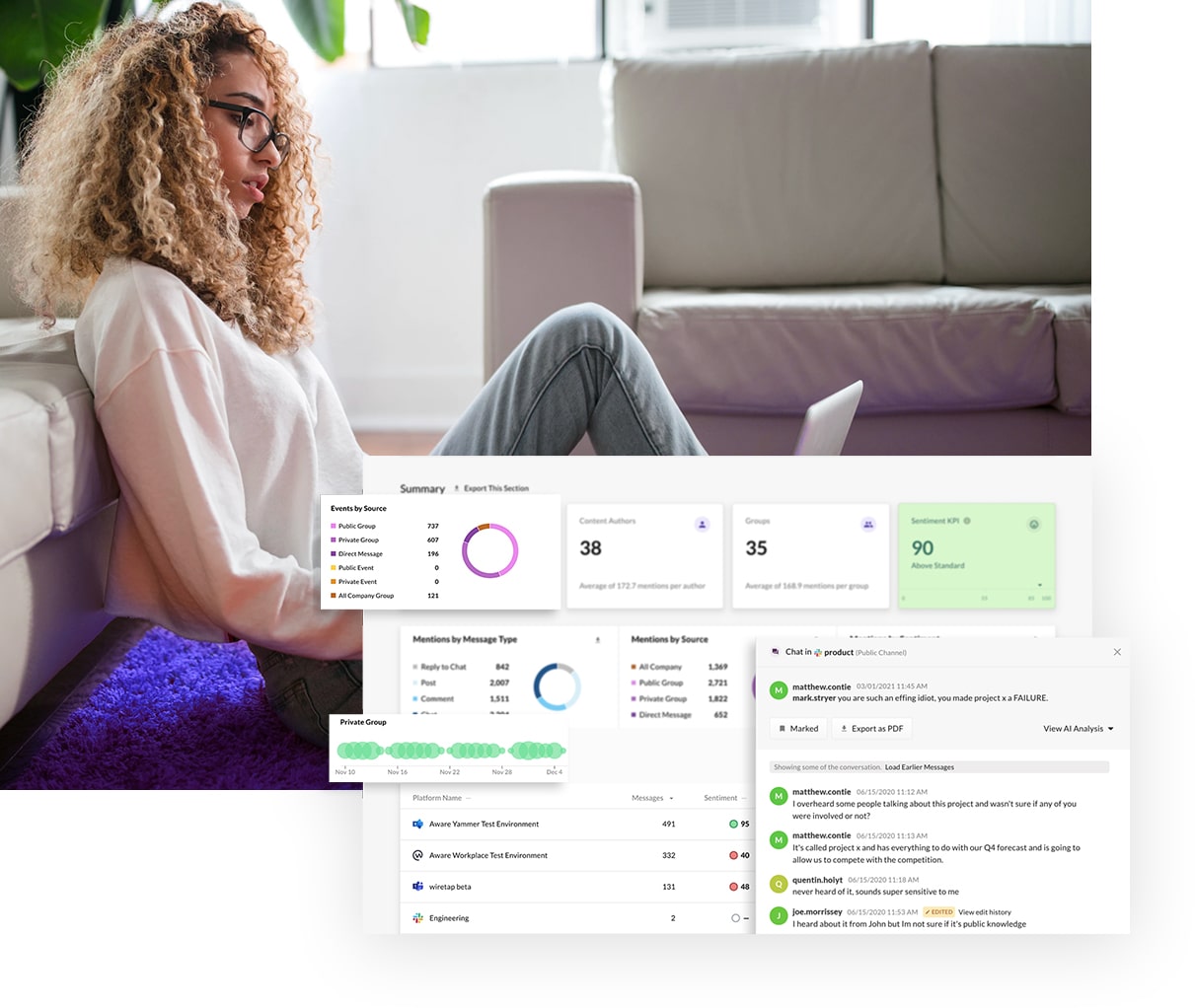
How does Aware protect PHI and support HIPAA compliance in Workplace?
Aware AI data platform for employee listening helps healthcare organizations and other covered entities to remain HIPAA complaint while using Workplace from Meta. Aware ingests and analyzes Workplace messages in real time and uses advanced machine learning workflows to automatically detect unauthorized and noncompliant content and alert administrators for faster, more effective compliance monitoring.
Additionally, Aware provides an immutable archive of messages, including edits and deletions, accessible through federated search to enhance eDiscovery, early case assessment, and internal investigations within complex Workplace datasets. Using Aware, healthcare organizations can:
- Satisfy legal requirements and ensure PHI is protected
- Remain compliant with regulations such as HIPAA
- Proactively protect their company culture
Final thoughts
While Workplace from Meta offers a robust communication and collaboration platform, it is not designed to be HIPAA compliant. Organizations subject to HIPAA regulations should exercise caution and establish training and guidance on handling PHI based on their specific compliance requirements. By using Aware to protect Workplace and support HIPAA compliance training, covered entities can ensure that they remain HIPAA compliant within Workplace from Meta and demonstrate that compliance to regulators if required.
